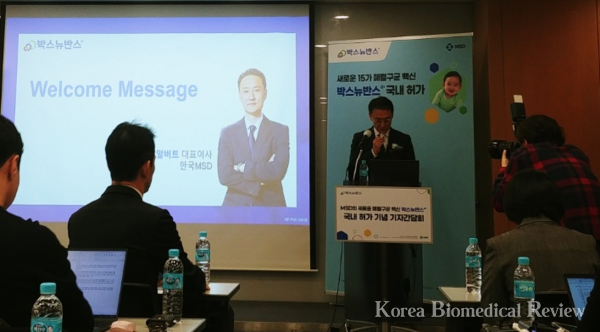MSD Korea held a press conference on Monday to celebrate the launch of Vaxneuvance, a 15-valent pneumococcal protein conjugate vaccine, in Korea.

The event underscored the need for collaborative efforts and policies to swiftly introduce and implement the new vaccine in Korea's medical sector.
Pneumococcus is the causative agent of pneumonia, as well as acute otitis media and meningitis. Person-to-person transmission through respiratory droplets poses a particular risk to the elderly and infants, potentially leading to fatal consequences. Pneumococcus was the fourth leading cause of death in Korea as of 2022.
Vaxneuvance is available for all ages ranging from 6 weeks to adults and currently licensed in 60 countries, including the U.S., Europe, Japan, and Australia.
It is licensed for the prevention of invasive diseases and pneumonia in people aged 6 weeks and older and acute otitis media in infants and adolescents aged 6 weeks to 17 years.
In Korea, it received marketing authorization from the Ministry of Food and Drug Safety on Oct. 31, marking the first approval of a pneumococcal protein conjugate vaccine in 13 years. Protein conjugate vaccines are made by conjugating specific proteins to the pneumococcal coat polysaccharide.
Infectious diseases are categorized according to the characteristics of the disease-causing bacteria, which are numbered and called serotypes. About 100 different pneumococcal serotypes can cause pneumococcal disease, but a small number of serotypes are known to cause most pneumococcal disease.
Vaxneuvance is characterized by the addition of two serotypes, 22F and 33F, which have recently been identified as serotypes that cause pneumococcal disease, to the 13 serotypes in the existing vaccine, expanding the scope of protection.
"Although the incidence of pneumococcal disease has been decreasing since the pneumococcal vaccine was included in Korea's national pediatric immunization program, about 14 out of every 100,000 infants, children, and adolescents aged 1 to 9 years in Korea still die from bacterial pneumonia," said Park Soo-eun, professor of pediatrics at Pusan National University Children's Hospital.
Korea has a well-established policy framework for nationally mandated immunizations for children, and the coverage rate of immunizations for children, including pneumococcal vaccines, is 96.1 percent, Park went on to say.
She hoped that the newly developed vaccine could be included in the national immunization program as soon as possible so that Korean children can benefit from the latest preventive vaccines.
"Vaxneuvance is a vaccine developed through MSD's long-standing experience in vaccines, accumulated technology with rich clinical experience, and is the first new product in the Korean pneumococcal vaccine market in about 13 years," MSD Korea Managing Director Albert Kim said. "We will do our best to quickly supply this vaccine to the medical field."

